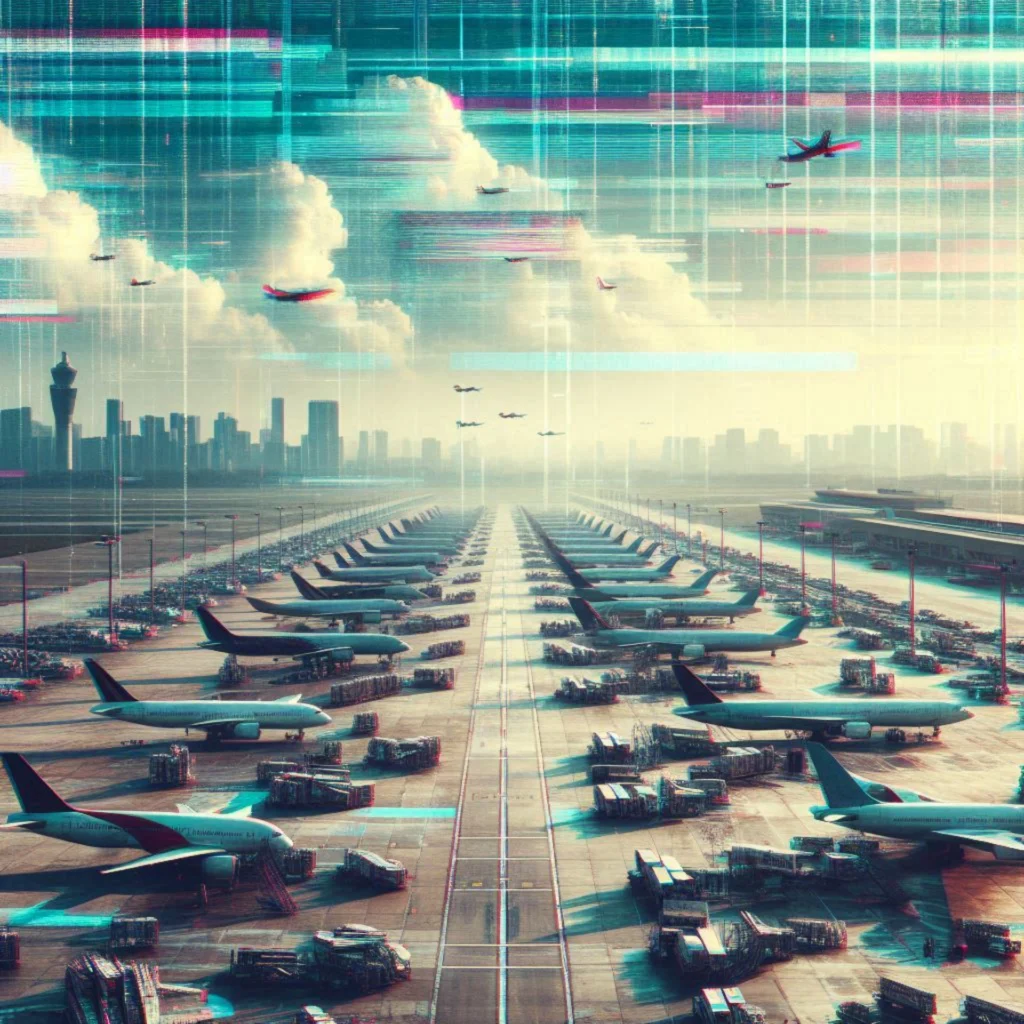On July 19, 2024, a massive cyber outage cascaded across the globe, impacting numerous critical sectors and halting daily operations. This unprecedented event demonstrated the fragility of our interconnected world and the profound implications of cyber vulnerabilities. This article delves into the potential what-if scenarios of this global cyber outage, exploring its effects on life, economy, health, transportation, and other vital areas.
The Immediate Impact: Grounded Flights and Silent Media

The immediate consequences of the cyber outage were felt across several industries. Flights were grounded, creating chaos in transportation. In the United States, the Federal Aviation Administration (FAA) faced severe disruptions, leading to a complete halt in air traffic for several hours. Delta Air Lines alone canceled over 250 flights, illustrating the profound impact on air travel logistics and passenger itineraries.
Simultaneously, media companies experienced blackouts, disrupting broadcasts and online news services. In the UK, major television networks went offline, causing a temporary information blackout. The interconnected nature of media and technology meant that news dissemination was severely hampered, raising questions about the reliability of information flow during crises.
Economic Disruption: Banks and Financial Services Hit Hard

Financial institutions were not spared. Banks worldwide reported system failures, rendering ATMs useless and online banking services inaccessible. In Nigeria, Sterling Bank’s network shutdown prevented any transactions, causing significant inconvenience to customers and businesses alike. The disruption in banking services highlighted the economic vulnerability to cyber incidents, especially in countries heavily reliant on electronic transactions.
The global financial market reacted with volatility, as investors feared prolonged outages could lead to more severe economic downturns. Stock exchanges faced delays in trading, further adding to the uncertainty. This scenario underscored the critical need for robust cybersecurity measures in the financial sector to maintain economic stability.
Health Sector: A Silent Emergency
Hospitals and healthcare facilities, increasingly dependent on digital systems for patient care and administrative functions, found themselves in a precarious situation. Electronic health records became inaccessible, delaying treatments and emergency responses. In Australia, several hospitals reported disruptions, forcing medical staff to revert to manual processes. This not only slowed down operations but also increased the risk of medical errors.
The outage also impacted the pharmaceutical supply chain. With distribution networks disrupted, critical medications faced delivery delays, potentially endangering patients with chronic conditions. This scenario highlighted the crucial role of cybersecurity in safeguarding public health.
Telecommunications: The Digital Lifeline Severed
Telecommunication networks, the backbone of modern connectivity, were severely affected. In South Africa, major telecom operators like Vodacom experienced intermittent connectivity issues due to undersea cable failures. These disruptions hindered communication, affecting businesses and personal communications alike.
In regions with ongoing socio-political tensions, such outages exacerbated existing issues. For instance, Nigeria’s connectivity problems due to undersea cable damage underscored the vulnerability of regions relying heavily on a limited number of infrastructure nodes. Such disruptions not only affect day-to-day communication but also have broader implications for national security and governance.
The Domino Effect: Cascading Failures Across Industries
The outage demonstrated the interdependence of global infrastructures. Logistics companies faced significant challenges as tracking systems and communication tools went offline. This disruption affected supply chains, causing delays in the delivery of goods and services. Retailers, especially those dependent on real-time inventory systems, found themselves unable to process transactions or manage stock effectively.
Energy sectors also faced critical issues. Smart grids, reliant on constant connectivity for monitoring and distribution, experienced operational difficulties. In some areas, power outages occurred as a result of the inability to manage grid systems remotely. This highlighted the potential for cyber incidents to escalate into physical disruptions, posing significant risks to public safety and infrastructure.
What-If Scenarios: A Deeper Dive into Potential Implications
Economic Collapse
Had the outage persisted longer, the world could have faced an economic meltdown. Prolonged disruptions in banking and financial services could lead to a loss of trust in digital transactions, pushing economies back towards cash-based systems. This regression would hinder economic growth, particularly in developing countries where digital finance is a critical driver of inclusion and development.
Health Crisis
A sustained cyber outage could precipitate a health crisis. Delays in medical treatments and disruptions in the pharmaceutical supply chain could lead to increased mortality rates. Moreover, the inability to access medical records could result in misdiagnoses and ineffective treatments, further straining healthcare systems already burdened by the demands of modern medicine.
Transportation Paralysis
Extended disruptions in air travel would severely impact global mobility. Tourism, a significant economic driver for many countries, would suffer immensely. Business travel, critical for international commerce and industry, would face severe setbacks, affecting global trade and collaboration.
Telecommunications Blackout
A prolonged telecommunications blackout would isolate regions, disrupting not just daily communications but also emergency services. In conflict zones or areas prone to natural disasters, the inability to communicate could have catastrophic consequences, impeding rescue operations and exacerbating crises.
Social and Political Unrest
In regions with fragile political environments, such an outage could incite unrest. The inability to access information, communicate with authorities, or perform basic economic activities could lead to public frustration and panic. Governments might face significant challenges in maintaining order and providing essential services.
Mitigation and Future Preparedness
The global cyber outage serves as a stark reminder of the importance of cybersecurity. Governments and organizations must invest in robust cyber defenses to protect critical infrastructures. Regular audits, comprehensive incident response plans, and international cooperation are essential to mitigate such risks.
Investing in Redundancy
Building redundant systems can prevent single points of failure. Diversifying communication channels, data storage solutions, and operational networks can ensure that even if one system fails, others can take over, maintaining continuity of services.
Enhancing Cyber Literacy

Public and private sectors must prioritize cyber literacy. Educating employees, stakeholders, and the general public about cyber hygiene practices can reduce the risk of cyber attacks. Awareness campaigns and training programs should be integral to organizational strategies.
International Collaboration
Cyber threats are borderless, requiring international collaboration. Countries must work together to establish norms, share intelligence, and respond to cyber incidents collectively. Organizations like the United Nations and INTERPOL can play pivotal roles in fostering such cooperation.
Conclusion: The Imperative of Vigilance
The global cyber outage of July 2024 was a wake-up call. It highlighted our reliance on digital systems and the potential consequences of their failure. As we move forward, it is imperative to build resilient infrastructures, foster international cooperation, and prioritize cybersecurity to safeguard our interconnected world. Only through collective effort can we mitigate the risks and ensure a secure digital future for all.
